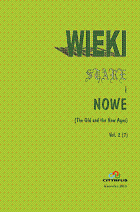General Stanisław Szeptycki as a commander of the Polish Army in 1919-1922 towards North-Eastern and South-Western outskirts of Poland
General Stanisław Szeptycki as a commander of the Polish Army in 1919-1922 towards North-Eastern and South-Western outskirts of Poland
Author(s): Sylwester FertaczSubject(s): History
Published by: Wydawnictwo Uniwersytetu Śląskiego
Keywords: Szeptycki; Polish-Bolshevik war; Silesia; restitution of Poland; concepts of Polishness
Summary/Abstract: Describing the attitude of General Stanisław Szeptycki to the problem of the Eastern borderline of the Republic of Poland - especially in the context of his function as a commander of different units of the Polish Army in the Polish-Bolshevik war and, in particular, in the context of his command of the North-Eastern Front - it can be argued that his approach would not differ from the opinions presented by the majority of independent activists of the time. Szeptycki's generation fought for a Poland (in a territorial sense) which had been erased from the map of Europe in the 18th century. His generation, to put things simply, did not know another Poland: the image of the country they would fight for was one inherited from their ancestors and it was such a Poland that dwelled in their hearts. Why then would they advocate the inclusion of Silesia, an organism eliminated from the Polish nation a long time before, within Poland? It may be argued that they would believe that the nation would be weak without a serious economic base (a gold apple in the Polish crown, as Szeptycki used to say about this land). Upper Silesia, as a part of the Republic of Poland, would compensate for the lack of access to the sea. The question that arises is whether general Szeptycki was not afraid if a significant number of ethnic minorites in a young nation, aware of their separateness, could weaken the nation and become the cause of internal fears. It seems that the general did not voice such anxieties. He himself was brought up in a family rooted in a culturally diversified environment, in the Russian-controlled area; he would then be educated and serve in the army in a multinational, dualistic, Austo-Hungarian Monarchy, which he treated as his political homeland until 1918. With his worldview shaped by such contexts, Szeptycki was certain that Poland reborn could be such a homeland for its loyal citizens, Polish nationals and groups of other ethnic extractions alike.
Journal: Wieki Stare i Nowe
- Issue Year: 7/2010
- Issue No: 2
- Page Range: 25-38
- Page Count: 14
- Language: English

